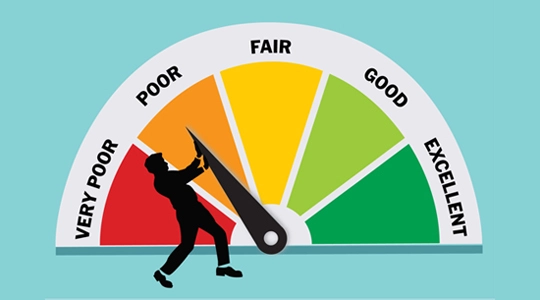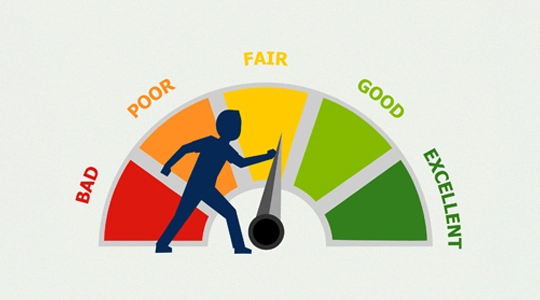What is credit score?
Credit score is a three digit numeric value that informs the credit providers as to the ability of the consumer in repaying the loan. Fico credit scores are between 300 and 850, with the high scores meaning you are less risky to the lenders. Your credit score is derived from information in your credit report, which tracks your record of paying loans and credit cards.
The three largest credit bureaus are Equifax, Experian, and TransUnion, and they each use the data in your credit report to come up with different scores for you. Thus, it is beneficial to review credit reports from each bureau at least once a year to identify errors that are dragging your scores down. Credit score tracking also assists an individual to receive better interest rates from any lender in case they need to secure a large loan such as a mortgage or an auto loan.
How credit scores are created?
Credit scores are derived from the information found in the credit report. These include credit reporting agencies collecting this data from lenders, banks, etc. regarding payment history, amounts owed, credit history length, new credit, and credit mix. This information is fed into credit scoring models that the agencies have designed, each of which assigns a point score to various factors. At the end of the point additions, you have a credit score. The points for the exams depend on the scores where the higher points mean better scores. It varies from 300 to 850. This means that if you have credit scores of more than 700, you can be in a position to be able to borrow money, obtain credit cards, mortgages, rental housing among other things, and this comes with better interest rates.
What is a good credit score and why does it matter?
A credit score of 700 and above is regarded as good. This score serves to inform lenders that one is a responsible debtor with good repayment of debts. This increases your likelihood of approval for loans and credit cards and consequently lower interest rates that will cost you less in the long run. As we have mentioned above, good credit also helps one to secure better offers in insurance, utilities, and even jobs. By checking your credit report and making sure that you pay all your bills on time, you are likely to have a good credit score. A good credit score reassures lenders that you are financially responsible and thus they are willing to lend to you.
Typical Credit Score Ranges
Scores don't exist in a vacuum; they are interpreted within a range. Here’s a general breakdown based on the common FICO 8 scale, which is widely used as a benchmark:
Poor (300-579)
Applicants in this range are considered subprime borrowers. It can be very difficult to get approved for credit, and if you are, it will come with very high interest rates and fees. You may also be required to pay a security deposit for credit cards or utilities.
Fair (580-669)
Borrowers in this range are likely to be approved for some credit, but not at the most competitive rates. You are on the cusp of moving into "prime" borrower territory but may still face higher costs.
Good (670-739)
This is the range for prime borrowers. You will likely be approved for a wide variety of loans and credit cards at competitive, market-average interest rates.
Very Good (740-799)
Consumers in this range are seen as low-risk borrowers by lenders. You will qualify for the best available rates and most attractive promotional offers.
Excellent (800-850)
This is the top tier. You have a proven, long-term track record of exceptional credit management and will receive the absolute lowest interest rates and best terms available.
Credit Score Basics: How is Credit Score Determined?
Credit scores are determined by the information that is included in your credit report. This information is gathered by the credit reporting agencies from lenders, banks and others about the details of your payment record, about the amounts you have outstanding, about the length of your credit history, about the types of credit you have in use and about any new credit accounts that you have. This information is then converted into detailed three-digit credit scores ranging from 300 to 850 through complex statistical models. The higher the score the better it is since it shows that you are a low risk and credit worthy. It calculates tardiness in payments, credit utilization ratio, and other factors to determine your ability to repay your debts responsibly. Thus, constant monitoring of credit reports and practicing financial discipline contributes to the development of a strong credit score.
Your credit score is a numerical value that can be anywhere between three hundred and eight hundred and fifty. The factors that influence this three-digit number include: The factors that influence this three-digit number include:
Payment history (35% of score): Whether you take bills or credit card payments, loan, electricity, water etc., payments, whether they are made on time or not, delinquencies affect.
Credit utilization (30%): Total revolving outstanding balances divided by the total revolving credit limits available on all credit cards and lines of credit. The usage of over 30% limits can in fact reduce scores.
Credit history length (15%): The age of credit accounts for the specific consumer. Longer helps. Furthermore, closed accounts can be taken into consideration for 10 years.
New credit (10%): The results show that that opening many new accounts in a short period is associated with higher risk and lower scores.
Credit mix (10%): And have credit cards, installment loans, mortgage, etc. makes the scores better.
Build Credit Now!
Factors that affect your credit scores
Payment history
Payment history is one of the most important factors that lenders consider when evaluating a potential borrower's creditworthiness. Payment history is a record of whether or not an individual has paid their bills on time and in full. This information is used to determine an individual's credit score, which can be used to determine how likely they are to default on future payments. In addition, payment history can also be used by employers and landlords to evaluate potential employees and tenants.
.webp)

Credit usage or utilization
Credit utilization is the amount of credit you use compared to the total amount of credit available to you. It is an important factor that lenders consider when evaluating your creditworthiness. Your credit utilization ratio helps lenders determine how likely you are to pay back a loan or other type of debt. The lower your utilization ratio, the better, as it shows lenders that you are not over-reliant on borrowed money and can manage your finances responsibly.
Length of credit history
The length of your credit history is an important factor when it comes to determining your credit score. A longer credit history generally indicates a better score, as it can show lenders that you have a track record of managing debt responsibly over time. It also helps lenders assess your risk level and determine whether or not to approve you for a loan or line of credit. Therefore, having a long credit history can be beneficial in many ways and can make it easier for you to get approved for loans with better terms and lower interest rates.


Credit mix and types
Credit mix and types are important factors when it comes to understanding your overall financial health. Having a good credit mix and understanding the different types of credit available can help you make informed decisions about how to manage your finances.
Credit mix refers to the different types of credit accounts you have, such as a mortgage, car loan, or student loan. Each type of account has its own unique requirements and benefits that can affect your overall credit score.
Factors that don’t affect your credit scores
- Income level: Your income is not a factor in determining your credit score.
- Employment status: Whether you're employed, unemployed, or self-employed doesn't impact your credit score.
- Savings and investments: Your savings accounts, investments, and assets have no bearing on your credit score.
- Age and marital status: Credit scores are based solely on credit history, not age or marital status.
- Race, ethnicity, or religion: Your demographics are not considered when calculating credit scores.
- Checking your score: Checking your credit score through credit bureaus won't harm your score.
- Soft inquiries: Soft credit inquiries, like background checks or pre-approval checks, don't affect your score.
Credit Score FAQ
1. What is a good credit score?
A good credit score is usually considered to be above 700 and it can help you qualify for loans and other forms of financing.
2. How to check credit score for free?
Call on (888) 803-7889 & know your credit score for free!
3. What is the highest credit score?
850 is highest credit score in all the credit burure.
4. what credit score is needed to buy a house?
Having a stellar credit score of 620 or higher can boost your chances of being approved for conventional loan options. Achieving such an impressive rating is key to financial success!
5. What credit score is needed to buy a car?
Achieving a good credit score is key for those looking to finance an automobile. Although 600 is the standard, lenders may require different scores depending on their criteria.